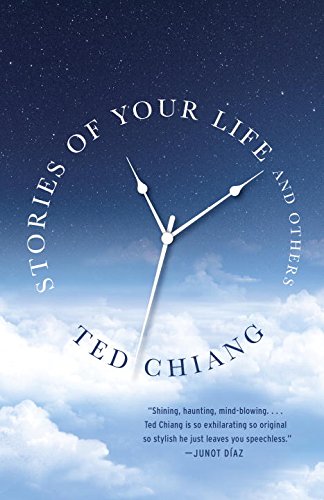Review: "Story of Your Life"

Samantha Schraub ’20 / Emertainment Monthly Staff Writer
Given that the theatrical release of Arrival this month was followed by glowing reviews, a light should be cast on the story that inspired the movie: Story of Your Life. Written by Ted Chiang, this novella was first published by Tor Books in 1998 when it was featured in Starlight 2, a science fiction anthology edited by Patrick Nielsen Hayden.
Story of Your Life is not a typical alien invasion story. Chiang ditches the tropes and clichés to create a truly original storyline. It focuses not on the chaos and destruction expected to come hand in hand with an alien invasion, but rather the intellectual struggle between man and extraterrestrial, as they try to communicate and learn from one another.
The short story takes a step into Dr. Louise Banks’ shoes. Banks is a reputable linguist who receives a request from the military to assist them in overcoming the language barrier dividing humans from heptapods—Earth’s new otherworldly visitors. Banks and the other enrolled scientists quickly discover that the heptapods have both a spoken language and a written language, which Banks labels Heptapod A and Heptapod B, respectively. Heptapod B relies on the reader’s perception of time and space, and as a result, alters Banks’ perception; this integrates the second—nonlinear—narrative of the story.
Loaded with technical linguistic and scientific jargon, this novella may not be for everyone. It follows the line of recent successes such as Andy Weir’s The Martian, detracting from plots anticipated to be action-filled, instead focusing on the equally interesting mechanics and science of a situation. Chiang’s writing incorporates the Sapir-Whorf Hypothesis, which is the basis for Heptapod B, into the heptapods’ language.
The story is told in a dual narrative format. In the second narrative, Banks tells her unborn daughter non-chronological snippets from the story of her life. This creates a parallel between the simplicity of life discoveries from childhood to adulthood, and the scientific discoveries Banks makes while communicating with the heptapod race. Simultaneously, the varying narratives create a paradox, as Banks explains what she remembers of the past and what will happen to her daughter in the future. The duality of the story gives it an ambiguity and air of mystery, which make the reader question everything that unfolds.
Ultimately, the reader is left with a full sense of understanding, an overwhelming feeling of familial sympathy, and a new knowledge of linguistics. Overall, Ted Chiang crafted an award-worthy science fiction novella that will resonate with readers, and leave them thinking how they would live—or even change—their present, if they knew their future.